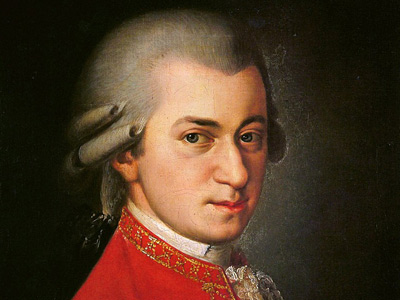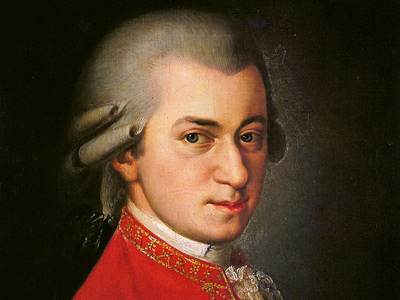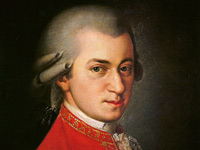Mozart's new career in Vienna began well. He performed often as a pianist, notably in a competition before the Emperor with Muzio Clementi on 24 December 1781, and he soon "had established himself as the finest keyboard player in Vienna". He also prospered as a composer, and in 1782 completed the opera Die Entführung aus dem Serail ("The Abduction from the Seraglio"), which premiered on 16 July 1782 and achieved a huge success. The work was soon being performed "throughout German-speaking Europe", and fully established Mozart's reputation as a composer.
Near the height of his quarrels with Colloredo, Mozart moved in with the Weber family, who had moved to Vienna from Mannheim. The father, Fridolin, had died, and the Webers were now taking in lodgers to make ends meet.
-
Outline of Wolfgang Amadeus Mozart (1756-1791)

HISTORIC PEOPLE
Wolfgang Amadeus Mozart (1756-1791)
Wolfgang Amadeus Mozart was a prolific and influential composer of the Classical era. He composed more than 600 works, many acknowledged as pinnacles of symphonic, concertante, chamber, operatic, and choral music. He is among the most enduringly popular of classical composers, and his influence is profound on subsequent Western art music. View Wolfgang Amadeus Mozart (1756-1791) »
Family and Childhood: In his early years, Wolfgang's father was his only teacher. Along with music, he taught his children languages and academic subjects.
1762–73: Travel: The family trips were often difficult, and travel conditions were primitive. They had to wait for invitations and reimbursement from the nobility, and they endured long, near-fatal illnesses far from home: first Leopold (London, summer 1764), then both children (The Hague, autumn 1765).
1773–77: Employment at the Salzburg court: Despite these artistic successes, Mozart grew increasingly discontented with Salzburg and redoubled his efforts to find a position elsewhere.
1777–78: Journey to Paris: While Mozart was in Paris, his father was pursuing opportunities of employment for him in Salzburg. With the support of the local nobility, Mozart was offered a post as court organist and concertmaster.
1781: Departure: Mozart did indeed soon meet the Emperor, who eventually was to support his career substantially with commissions and a part-time position.
1782: Early Years: Mozart's new career in Vienna began well. He performed often as a pianist, notably in a competition before the Emperor with Muzio Clementi.
1782–1786: In 1783, Mozart and his wife visited his family in Salzburg. His father and sister were cordially polite to Constanze, but the visit prompted the composition of one of Mozart's great liturgical pieces, the Mass in C minor.
1786–87: Return to Opera: Despite the great success of Die Entführung aus dem Serail, Mozart did little operatic writing for the next four years, producing only two unfinished works and the one-act Der Schauspieldirektor.
1788–90: Later Years: Around this time, Mozart made some long journeys hoping to improve his fortunes: to Leipzig, Dresden, and Berlin in the spring of 1789, and to Frankfurt, Mannheim, and other German cities in 1790.
1791: Final Illness and Death: Mozart's last year was, until his final illness struck, a time of great productivity—and by some accounts, one of personal recovery. He composed a great deal, including some of his most admired works.

Wolfgang Amadeus Mozart (1756-1791)
Wolfgang Amadeus Mozart was a prolific and influential composer of the Classical era. He composed more than 600 works, many acknowledged as pinnacles of symphonic, concertante, chamber, operatic, and choral music. He is among the most enduringly popular of classical composers, and his influence is profound on subsequent Western art music.
- Family and Childhood
- 1762–73: Travel
- 1773–77: Employment at the Salzburg court
- 1777–78: Journey to Paris
- 1781: Departure
- 1782: Early Years
- 1782–1786
- 1786–87: Return to Opera
- 1788–90: Later Years
- 1791: Final Illness and Death
| Holy Roman Empire | |
|---|---|
 |
Born: 27 January 1756 Getreidegasse 9, Salzburg
Died: 5 December 1791 (aged 35) Vienna
Notable: Mozart is widely regarded as one of the greatest composers in the history of Western music




RESOURCES
This article uses material from the Wikipedia article "Wolfgang Amadeus Mozart", which is released under the Creative Commons Attribution-Share-Alike License 3.0.
© Stories Preschool. All Rights Reserved.
"Building Cool Educational Stuff for children and adults!"


Historic Battles
Wars and military campaigns are guided by strategy, whereas battles take place on a level of planning and execution known as operational mobility.
View Historic Battles »


Historic People
A historical figure is a famous person in history, such as Alexander the Great, Admiral Yi Sun-Shin, Abraham Lincoln, George Washington, Christopher Columbus, or Napoleon Bonaparte.
View Historic People »


Historic Timeline
Describes the history of humanity as determined by the study of archaeological and written records. Ancient recorded history begins with the invention of writing.
View Historic Timeline »

Historic Legends
Beings in myths are generally gods and goddesses, heroes and heroines, or animals and plants. Most myths are set in a timeless past before recorded time or beginning of the critical history.
View Historic Legends »

Sports World
Includes competitive games which, through casual or organized participation, aim to use, maintain or improve physical ability and skills while providing enjoyment to participants.
View Sports World »

Untold Stories
If you have any questions, feedback or suggestions for us, we'd like to hear from you. Please feel free to contact us!
Contact Us

Historic Battles
Wars and military campaigns are guided by strategy, whereas battles take place on a level of planning and execution known as operational mobility.
View Historic Battles »

Historic People
A historical figure is a famous person in history, such as Alexander the Great, Admiral Yi Sun-Shin, Abraham Lincoln, George Washington, Christopher Columbus, or Napoleon Bonaparte.
View Historic People »

Historic Timeline
Describes the history of humanity as determined by the study of archaeological and written records. Ancient recorded history begins with the invention of writing.
View Historic Timeline »

Historic Legends
Beings in myths are generally gods and goddesses, heroes and heroines, or animals and plants. Most myths are set in a timeless past before recorded time or beginning of the critical history.
View Historic Legends »

Sports World
Includes competitive games which, through casual or organized participation, aim to use, maintain or improve physical ability and skills while providing enjoyment to participants.
View Sports World »

Untold Stories
If you have any questions, feedback or suggestions for us, we'd like to hear from you. Please feel free to contact us!
Contact Us
Historic Battles
Wars and military campaigns are guided by strategy, whereas battles take place on a level of planning and execution known as operational mobility.
View Historic Battles »

Historic People
A historical figure is a famous person in history, such as Alexander the Great, Admiral Yi Sun-Shin, Abraham Lincoln, George Washington, Christopher Columbus, or Napoleon Bonaparte.
View Historic People »

Historic Timeline
Describes the history of humanity as determined by the study of archaeological and written records. Ancient recorded history begins with the invention of writing.
View Historic Timeline »

Historic Legends
Beings in myths are generally gods and goddesses, heroes and heroines, or animals and plants. Most myths are set in a timeless past before recorded time or beginning of the critical history.
View Historic Legends »

Sports World
Includes competitive games which, through casual or organized participation, aim to use, maintain or improve physical ability and skills while providing enjoyment to participants.
View Sports World »

Untold Stories
If you have any questions, feedback or suggestions for us, we'd like to hear from you. Please feel free to contact us!
Contact Us